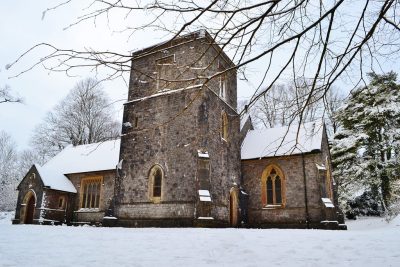St Ann’s Church in Talygarn

St Ann’s church lies on the south side of Brynsadler.
It was built in 1887 to designs of George Thomas Clark of Talygarn House, well-known antiquary and the manager of the Dowlais Ironworks, in memory of his wife Ann Price Clark (d.1885)
Designed in a generally perpendicular style with a decorated east window, it consists of three-bay nave with porch, lower and narrower chancel with lean-to vestry against the gable end, and four-square three-stage south tower built against the chancel.
The medieval chapel of Talygarn stands in the churchyard and you can still see four walls standing full height and the two side walls of a porch on the south side.
At some time three tie-bars have been inserted to hold the south and north walls in place. Inside the walls are plastered. The roof fell in in 1926 but at the west end some tiles remain on the gable end. A late 13th – mid 14th century trefoil headed lancet with good quality ashlar dressings is located in the east wall. There are three large segmental headed windows in the south wall.
The church was restored in the 1680’s under the terms of the will of Sir Leoline Jenkins, and the three windows belong to this phase. The chapel became disused in the 19th century when the adjacent church of St. Ann’s was built.
In the mid 1980s the new vicar of the parish noticed an interesting small wall mosaic of a bearded man with dark eyes. He sent a photograph to a colleague who was an art historian who identified it as a missing piece of the 11th Century Last Judgement mosaic from the Cathedral of Santa Maria Assunta in Torcello, Venice.
It seems this was the head of the 12th apostle and had been stolen in the 1850s by an unscrupulous restorer, Gionvanni Moro.
It was installed by Clark when he built the church. It is not known how he acquired it but he did visit Venice after his wife died in 1885 and most likely purchased it there as he was making plans for the church at this time.
The mosaic was removed from the church and sold at Sotheby’s in London for $427,152 by a New York art dealer. The proceeds went to the Church of Wales and St Ann’s church still houses a copy.
For more information about the history of the community of Pontyclun please visit our online museum